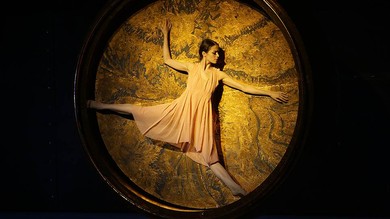One of the most important works of Tischenko is his ballet Yaroslavna, inspired by The Tale of Igor’s Campaign: this touchstone of Russian literature dates from the 12th century, and has always attracted artists in all genres since its recovery in the early 19th century. The Tale was the basis of one of the greatest Russian operas, Prince Igor by Alexander Porfirievich Borodin.
Boris Tishchenko wrote the ballet Yaroslavna in 1974 for the Maly Opera Theatre in Leningrad. The production choreographed by Oleg Vinogradov and directed by Yuri Lyubimov was one of the ballet highlights of the 1970s. The innovative masterpiece was acclaimed not only by the Soviet public and critics but also by the guests of the prestigious Festival d'Avignon. At the core of the production lies a radically different interpretation of The Tale of Igor's Campaign from the one we have seen in the opera Prince Igor. This production features spectacular director’s work and Tishchenko’s piercing music, which has hypnotised the audience for 14 years – the number of years the production ran at the theatre. Vladimir Varnava is to bring back Tishchenko’s work with new choreography. Varnava is one of the most popular and hard-working choreographers in Russia. He has staged productions for the Creative Workshop of Young Choreographers at the Mariinsky Theatre, for Les Ballets de Monte Carlo, has collaborated with drama directors and worked on his own projects. All Varnava’s work can be distinguished by its unique movement language and director’s vision, which never fails to impress the public and the professionals.
Synopsis
I. Dissension
Tempted by Div, Prince Igor dreams of "the first glory themselves kidnapped, and back themselves to share".
One can hear the groaning of the Russian lands. Here there is intestine strife – nothing unusual. Murder comes as no surprise. Div is intoxicated by the smell of new blood. The heavens descend. The saints lament murder, but the people do not listen to them.
Princess Yaroslavna, however, has seen a terrifying future through the eyes of the dead.
All of the princes want power, but not all of them will receive it. And Igor's armed force is out for revenge. The young prince inspires them. Their blood boils. The young men join the irregulars and stand before Igor's banner in order to bring themselves honour and glory for the prince. The men of the campaign are assembled. Igor commands them to destroy the enemy – "Praise Igor!"
Yaroslavna has too little time with Igor. She is unable to dissuade her husband who is convinced he is in the right. The prince gives the command for the campaign to commence. Div calls out, anticipating a blood-bath.
The sun vanishes. It is an eclipse.
II. The Black Act
The campaign continues. The army arrives in the darkened Polovtsian lands. The Steppe is stupefying. Here there are glimmers of past disasters and spectres of impending catastrophes. It is terrifying. But the first battle against the Polovtsians delivers an easy victory. Each gets his reward: Igor receives a trophy and the impassioned army can be entertained by the Polovtsian maidens.
But when the warriors fall asleep a maiden carries in a bleeding sacrifice in order to announce her tribe. The Polovtsians' night-time premonitions are proved right. They all merge together in a shamanistic dance and pray to an idol. Div is content.
III. Salvation
Upon awakening, the prince knows no peace. Igor convinces the remnants of his army to march onwards.
Suddenly an oasis appears! How their dear friends meet the armed force! Everything the warriors have dreamed of on the road – here it is! Food, drink and women... And the most important gift is for the prince!
But in fact it is an ambush. The second battle is lost ingloriously. The warriors are in the Steppe of death.
The princess feels it: death is all around, but Igor is still alive. The wind brings in Yaroslavna's lament: she is ready to beg the gods, the waters and the earth if only her husband comes back.
Igor is in captivity. The souls of dead warriors fly past in a flurry.
Div is triumphant. He is prepared to arrange an escape so that Igor can assemble a new army.
Yaroslavna is in despair. She is finished. She has neither energy nor hope. The boy promises that he will return. But Igor's return is overcast by grief.
A new conscription is announced. The sword has been forged and the enemy is gathering. Shall we go?
And what will the prayer be about – of future victories or of peace?
 Mariinsky Theatre:
Mariinsky Theatre:  Mariinsky-2 (New Theatre):
Mariinsky-2 (New Theatre):  Mariinsky Concert Hall:
Mariinsky Concert Hall: 

